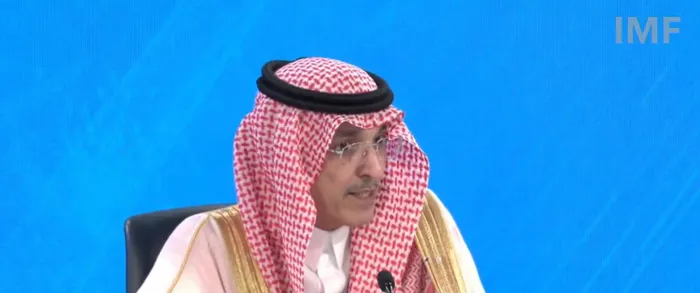IMFC commits to stronger global cooperation amid rising uncertainty, economic transformation
IMF

In a statement on Friday following its latest 52nd meeting, IMFC chairman Mohammed Aljadaan, who is the Minister for Finance of Saudi Arabia, said that while global growth remains resilient, it faces mounting pressures from high debt, geopolitical tensions, extreme weather events, and shifting trade and demographic dynamics.
Image: Screenshot/X
The International Monetary and Financial Committee (IMFC) has pledged to strengthen international cooperation and sound policymaking to safeguard global stability, address rising debt risks, and advance sustainable growth as the world economy undergoes a profound transformation.
In a statement on Friday following its latest 52nd meeting, IMFC chairman Mohammed Aljadaan, who is the Minister for Finance of Saudi Arabia, said that while global growth remains resilient, it faces mounting pressures from high debt, geopolitical tensions, extreme weather events, and shifting trade and demographic dynamics.
Aljadaan emphasized that these global challenges bring not only risks but also opportunities for reform and innovation.
“The global economy is undergoing a profound transformation,” Aljadaan said. “Major policy shifts in trade and other areas are reconfiguring global markets and policy frameworks, heightening uncertainty. Growth has been resilient, but strains are emerging.”
Aljadaan said the Committee reaffirmed its commitment to adopt sound macroeconomic policies that foster confidence, build resilience, and maintain financial stability. It underscored the importance of strong economic institutions, especially independent central banks, to ensure credibility and trust in policymaking.
Member countries agreed to calibrate fiscal policies carefully, deepening fiscal adjustments where necessary to maintain debt sustainability and rebuild buffers.
These adjustments, Aljadaan said, should be grounded in credible medium-term strategies that boost efficiency, mobilize domestic resources, and preserve social cohesion while supporting growth-enhancing investments.
Central banks, Aljadaan added, remain committed to maintaining price stability in line with their mandates and will continue to communicate policy decisions clearly and transparently.
The IMFC highlighted emerging risks from non-bank financial institutions, digital assets, and artificial intelligence (AI), calling for stronger oversight of systemic vulnerabilities while still harnessing innovation for financial inclusion and efficiency.
It also urged governments to advance structural reforms to improve the business environment, combat corruption, and promote technology adoption.
“In an increasingly interconnected world, cooperation between countries will be essential to ensure the stability and effective functioning of the international monetary system,” Aljadaan said.
The Committee placed particular emphasis on tackling global debt challenges, especially in low-income and vulnerable countries. It called on the IMF to deepen its work on debt vulnerabilities and to strengthen support for countries implementing reforms.
The IMFC welcomed progress under the G20 Common Framework for Debt Treatments and the Global Sovereign Debt Roundtable, stressing the need for more predictable, timely, and coordinated implementation, as well as enhanced transparency from all creditors, including private ones.
Members also supported the joint IMF–World Bank “three-pillar approach” to help countries manage debt pressures while fostering growth, mobilizing private capital, and boosting domestic revenues.
The IMFC endorsed ongoing efforts to modernize IMF surveillance to provide more tailored and candid policy advice, helping countries strengthen resilience, ensure debt sustainability, and promote balanced global growth.
It noted progress in the Comprehensive Surveillance Review and the Review of Financial Sector Assessment Programs, which aim to keep financial oversight aligned with evolving risks.
The Committee also welcomed reviews of IMF lending programs — including the Short-Term Liquidity Line — and urged full implementation of reforms to the Poverty Reduction and Growth Trust to ensure sustainable lending capacity.
Capacity development, the IMFC said, remains a vital pillar of the IMF’s support to its members. It backed efforts to deliver flexible, well-integrated, and adequately financed technical assistance and training in line with the Fund’s 2024 Capacity Development Strategy.
Reaffirming its commitment to a strong, quota-based, and adequately resourced IMF, the IMFC urged the swift completion of the 16th General Review of Quotas to strengthen the institution’s financial foundation. Members agreed that future quota realignment should better reflect countries’ positions in the world economy while protecting the shares of the poorest nations.
The Committee also welcomed ongoing efficiency and streamlining efforts within the IMF and reiterated support for greater regional and gender diversity among staff and leadership.
The IMFC said it will continue to focus on fostering cooperation, addressing debt and climate vulnerabilities, and promoting sustainable and inclusive global growth.
“Ending wars and conflicts and securing lasting peace remain essential for sustainable growth and long-term stability,” the statement concluded.
The Committee’s next meeting is scheduled for April 2026.
BUSINESS REPORT